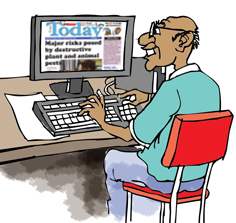The COVID-19 pandemic has shown how vulnerable we humans are currently and how urgently we must repair our broken relationship with nature.
Nature, not only sustains us, it also accounts for the huge profits the world enjoys today. In PNG the natural resource sector accounted for 89% of PNG’s total export value in 2018. It also comprised 29% of PNG’s GDP. To the government it contributed 10.1%.
World economic reports show millions of dollars poured out from the trees and the fish and it feels so sweet we humans will not stop the reckless grabbing. We open up the earth’s belly and scrape out every bit of metal is there.
Our ecological system cannot take this any more. It has collapsed and humans want to hang on to an economic system that is failing. The simple messages of wash your hands, keep your distance and stay at home really are about stopping and taking stock of our behaviors and practices.
But how do these relate to the environment? Our cities are so full they are not able to handle the human population, the noise and the air pollution. COVID-19 is saying go back to natural lifestyle. Breathe more fresh air and eat natural fresh food.
COVID-19 although catastrophic, has opened doors for opportunities to rethink the current economic system. Is a market driven economy based on natural resource extraction still the way to go? Can we continue to live with the ill health of our people and the environment?
In recovering from this great disruption we cannot go back to business as usual. A new business model must be based on the realization that the health of humans, environment and all that live within are interdependent.
The natural world is confused. Rains don’t know when they should hold off any more and the dry season no longer a worry for indigenous communities. Yam houses and sago pots are not filled consciously and diligently in preparation for the coming long dry season. But off course we don’t know any more when the dry season is coming so why prepare?
Deep in the mountains and forests of Papua New Guinea indigenous communities continue their traditional lifestyle – feeding from the abundance nature provides and when they get sick they seek the help of plants, sea and the rivers.
Indigenous communities around the world have sustainably cared and managed their environments for many generations.
By reinventing a new economic model that places the environment at the center is not returning to ancient days but an opportunity to create a better new world. This is the time to once again search ourselves for if our rural populations can sustain their livelihoods for thousands of years without much help from outside so can the rest of PNG.
By Rosa Koian



